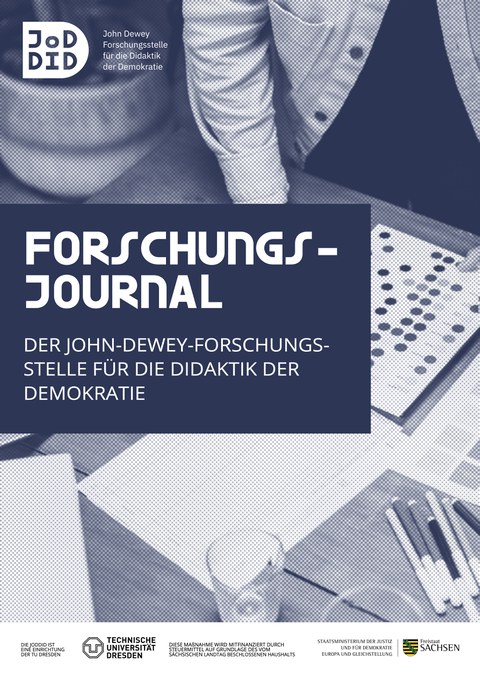Research journal
The John Dewey Research Center for the Didactics of Democracy (JoDDiD) is publishing its first research journal.
In it, JoDDiD employees present not only initial research results from our studies, but from all areas of work. The research and further development of all of JoDDiD's fields of activity (innovation, consulting, training and further education as well as transfer) is based on an integrative research concept that not only relies on the implementation of proven studies, but also evaluates existing research secondarily and makes it visible in transfer formats for the field of practice.
Allgemeine Beschreibung des Forschungsjorunals der JoDDiD © Tina Hölzel
In addition, existing formats, strategies, materials and methods are not only designed, but their practical implications are also reflected upon, evaluated and further developed on this basis. This research journal documents this process and is intended to provide an insight into the research work of JoDDiD.
The following articles are included in the research journal:
1. "Someone needs to make visible the pressure we are under and the conditions under which we do this work"
Rico Lewerenz and David Jugel summarize the research results of an explorative study by JoDDiD on the challenges and needs of extracurricular civic education in Saxony. The study not only reveals training backgrounds, career paths and further training needs in the field, but also disturbing conditions with regard to attacks on projects and educators as well as precarious working conditions. Concrete proposals for the support and further development of structures and processes in the field will be put forward.
2. tried out! The political Turing test as a playful format to promote empathic engagement with controversial topics
© Tina Hölzel
Maren Jung describes the political Turing test, based on the test designed by Alan Turing in the 20th century to differentiate between humans and machines, and how it can be used to promote cognitive empathy. In her article, she describes observations from initial implementations in the context of performance art and draws conclusions for future applications of this educational method.
3. approaches for evaluation processes in workshop formats - observations from the field of counseling in the field of extracurricular political education in Saxony.
© Tina Hölzel
Agnes Scharnetzky focuses on the question of the extent to which interviewing teamers and educators to evaluate educational formats can be a useful addition to established methods and what advantages result from this. In addition, open research questions are formulated that are aimed at an in-depth examination of participatory evaluation methods and the reflexive further development of educational formats.
4. further training as a resource for professionalization research in the field of extracurricular political youth and adult education
Nele Mai and Anja Besand look at the JoDDiD evening school's digital continuing education program and discuss the extent to which it facilitates access to the field of extracurricular political education and what can be learned from the answers in the associated final exam.
5. cooperation seminars for and with extracurricular political educators. Consequences from the first pilot project at TU Dresden
© Tina Hölzel
Ann-Christin Belling reflects on training-relevant experiences in a cooperation seminar with student teachers of social studies/legal education at TU Dresden and students of the Bachelor of Social Pedagogy & Management at Dresden University of Applied Sciences (FHD). In it, she states that such seminar offerings can have great added value not only for student teachers and prospective social pedagogues, but for numerous other degree programs that are often the starting point for activities in the field of non-formal education.
6 How do stakeholders in non-formal civic education describe the goals of their work? Four observations from working with Saxon stakeholders
Kathleen Markwardt describes various observations in advisory contexts. She particularly emphasizes that activation, exchange formats and the empowerment of individuals are repeatedly mentioned as goals of the stakeholders. It also becomes clear that didactic concepts are hidden behind these formulations of objectives, but that these are not reflected and further developed against the background of professional terms. Based on this, she develops various desiderata that need to be researched in the field.
7 A room on wheels. An observation of the JoDDiD rumor mill in public space
© Tina Hölzel
Elisa Moser, on the other hand, deals with the practical use of our rumor mill. The rumor kitchen is a mobile stand developed by JoDDiD to encourage people to spend some time together, have a drink or a snack and use materials and impulses to facilitate an exchange on political issues. The first practical applications will be observed and evaluated, conditions for success will be highlighted and possibilities for further development will be discussed.
8 Why actually transfer? An introduction to the transfer concepts in JoDDiD
© Tina Hölzel
Tina Hölzel deals with communication channels between science and practice and discusses formats and approaches to transfer in political education. Specifically, she presents the potential of social media and podcasts using the example of JoDDiD's work and derives development approaches for the discourse. She encourages us to rethink science communication.

